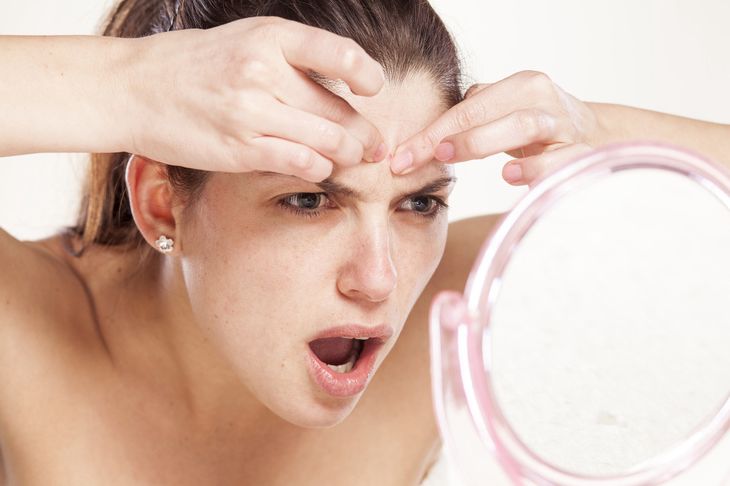Stres a pryszcze - Jak stres wpływa na Twoją skórę i jak sobie z nimi radzić
Jak leczyć trądzik ze stresu? Jak pielęgnować skórę?
Trądzik na tle nerwowym to przypadłość, którą można i trzeba leczyć. Niewłaściwa pielęgnacja domowa nierzadko pozostawia ślady na twarzy, a dodatkowo pobudza do nadmiernego wydzielania sebum.
Dlatego zamiast używać gruboziarnistych peelingów do skóry i preparatów na bazie alkoholu, postaw na łagodne dermokosmetyki dedykowane cerze trądzikowej. Tego typu środki mają znacznie większą siłę działania niż klasyczne kosmetyki, które znajdziesz w drogerii. Dzieje się tak, ponieważ stężenie w nich substancji aktywnych jest wyższe.
Zadaniem takich preparatów jest łagodzenie i zwalczanie trądziku stresowego poprzez dostarczanie skórze takich składników, które:
- zmniejszają namnażanie się bakterii,
- ograniczają łojotok,
- wspierają delikatne złuszczanie rogowaciejącego naskórka,
- nawilżają skórę,
- łagodzą podrażnienia.
Tak wieloaspektowego działania potrzebuje skóra, na której rozwija się trądzik przez stres.
Jakich substancji szukać w preparatach na trądzik? Sprawdzą się tu przede wszystkim pochodne witaminy A oraz alfa i beta-hydrokwasy. Pomóc mogą też środki z cynkiem i napary z bratka.
Aby zatroszczyć się o swoją cerę trądzikową, nie musisz podejmować bardzo wymagających działań pielęgnacyjnych. Wystarczy, że wspomnianymi kosmetykami myjesz swoją twarz dwa razy dziennie. Natomiast w okresie upałów, gdy skóra poci się znacznie bardziej, możesz stosować je częściej.
Aby wyleczyć trądzik, działaj też na przyczynę, czyli - o ile to możliwe - staraj się ograniczyć lub całkowicie wyeliminować źródło stresu. Być może to dobry czas na zmianę pracy lub środowiska, w którym przebywasz. Jak wiesz, stres wpływa nie tylko na rozwój trądziku, ale też szybsze starzenie się skóry, dlatego dbałość o relaks powinna być Twoim priorytetem.
Pomocne w walce z trądzikiem są również różnego rodzaju zabiegi kosmetyczne. Zamiast jednak decydować się na manualne oczyszczanie twarzy, które może wywołać odwrotny efekt, tj. nadmierne zanieczyszczenie, w pierwszej kolejności udaj się do dermatologa. Specjalista wskaże Ci odpowiednie metody terapeutyczne. Możesz postawić na:
Jak stres wpływa na skórę?
Stres powoduje, że organizm produkuje więcej hormonu stresu - kortyzolu. Prowadzi to do stanu zapalnego, który może pogorszyć trądzik. Stres powoduje również wzrost produkcji oleju. Nadmiar oleju zatyka pory i przyczynia się do powstawania wyprysków.
Aczedol (Krem na trądzik)
Ponadto wysoki poziom stresu zaburza równowagę hormonalną. Może to zwiększyć produkcję sebum i wytrącić proces odnowy skóry z równowagi. Rezultat? Więcej zatkanych porów, podrażnień i wyprysków.
Stres może również powodować niezamierzone pogorszenie stanu skóry. Na przykład, może Pani/Pan bardziej rozdrapywać przebarwienia lub zapominać o regularnej pielęgnacji skóry. Wszystkie te skutki stresu mogą prowadzić do zaostrzeń.
Mental health resources
Visit our dedicated hub for more research-backed information and resources on mental health and well-being.
Stress slows down some normal bodily functions, such as those that the digestive and immune systems perform. The body can then concentrate its resources on breathing, blood flow, alertness, and the preparation of the muscles for sudden use.
The body changes in the following ways during a stress reaction:
- blood pressure and pulse rise
- breathing speeds up
- digestive system slows down
- immune activity decreases
- muscles become more tense
- sleepiness decreases due to a heightened state of alertness
How a person reacts to a difficult situation will determine the effects of stress on overall health. Some people can experience several stressors in a row or at once without this leading a severe stress reaction. Others may have a stronger response to a single stressor.
An individual who feels as though they do not have enough resources to cope will probably have a stronger reaction that could trigger health problems. Stressors affect individuals in different ways.
Some experiences that people generally consider to be positive can lead to stress, such as having a baby, going on vacation, moving to a better home, and getting a promotion at work.
A person may look forward to an increased salary following a promotion, for example, but wonder whether they can handle the extra responsibilities.
A persistently negative response to challenges can have an adverse effect on health and happiness.
For example, a 2018 review of studies found associations between work-related stress and coronary heart disease. Despite this, the authors could not confirm the exact mechanisms through which stress causes coronary heart disease.
Other literature has shown that people who perceive stress as having a negative effect on their health may be at higher risk for coronary heart disease than those who do not.
Czy można zapobiegać trądzikowi ze stresu? Profilaktyka
Czy można ochronić się przed trądzikiem ze stresu? Przede wszystkim należy zmniejszyć poziom ogólnego stresu, w którym żyjesz. Jeżeli ograniczysz sytuacje stresowe albo też nauczysz się radzić sobie ze stresem i zaakceptujesz pewne rzeczy w Twoim życiu, stres być może nie zawładnie Tobą i Twoją skórą.
Drugim aspektem jest także stosowanie odpowiednich technik relaksacyjnych. Do tej pory zajadałaś/eś stres niezdrowymi przekąskami? Zamień ten szkodliwy dla Twojej skóry nawyk na:
- aktywność fizyczną,
- jogę,
- medytację.
Staraj się też zachować równowagę pomiędzy życiem prywatnym a pracą.
Dbaj także o swoją skórę, stawiając przede wszystkim na zdrową dietę, a także na profilaktyczne zabiegi kosmetyczne, które zmniejszą ryzyko rozwoju trądziku.

 U nas zapłacisz kartą
U nas zapłacisz kartą
